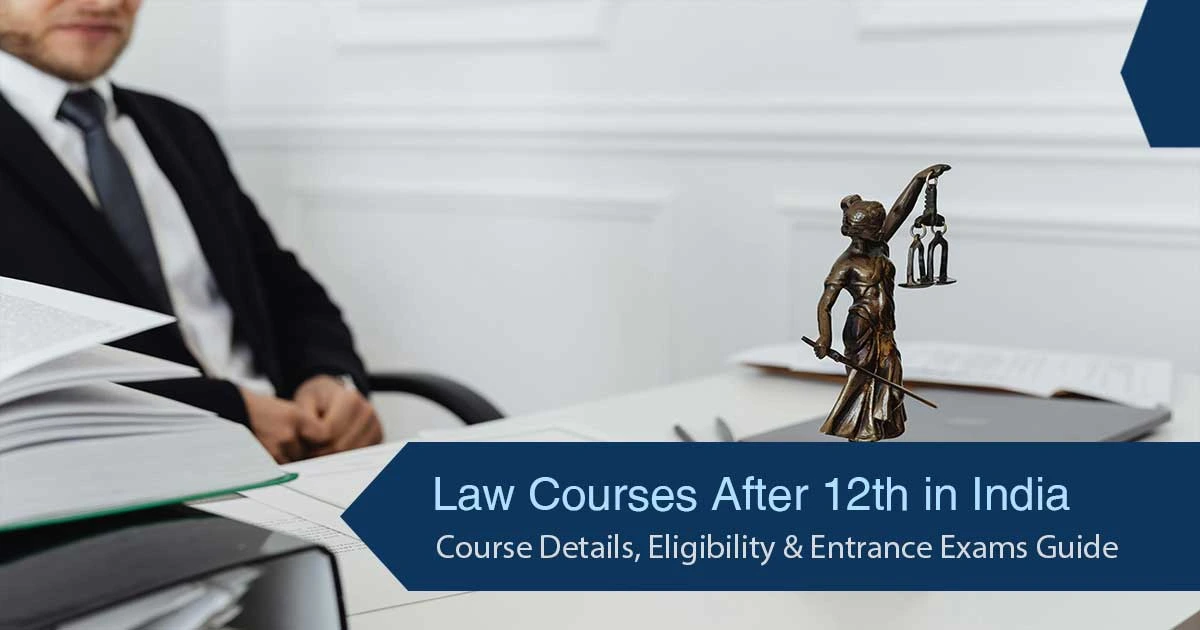Blog Detail


Law Courses After 12th in India: A Comprehensive Guide
26-04-2025

Deciding on a career path after completing grade 12 can feel like a rollercoaster ride. For those passionate about the role and function of the law, advocacy, and a holistic understanding of societal structures, law courses in India offer an excellent option for students to consider.
This blog will break down the various types of law courses available, their eligibility criteria, and the entrance exam for law after 12th, providing a roadmap for aspiring legal professionals.
Law Courses After 12th
After 12th law courses, students focus on different interests and career aspirations, as per their interest areas. The most popular choice is the integrated Bachelor of Laws (LLB) programme, which combines a bachelor's degree in arts, science, or commerce with a law degree. These law courses after 12th typically span five years and provide a comprehensive understanding of legal courses and their components.
Here are some popular integrated LLB programmes:
- BA LLB focuses on humanities and social sciences alongside legal studies.
- BSc LLB integrates science subjects with legal principles, which is ideal for those interested in environmental or intellectual property law courses in India.
- BCom LLB combines commerce and law, which is suitable for careers in corporate law or finance.
- BBA LLB integrates Business Administration with law, providing a suitable foundation for understanding business policies and the law.
Eligibility for LLB Programmes
The law course eligibility criteria generally require students to have completed their 10+2 education from a recognised board with a minimum aggregate score, usually around 45% to 50%. Additionally, specific requirements may vary based on the university or college.
Cracking the Entrance Exams
Admission to law courses after 12th grade is primarily based on entrance exams. These exams assess a candidate's aptitude for legal studies, encompassing logical reasoning, analytical skills, general knowledge, and proficiency in the English language.
Some of the prominent entrance exam for Law after 12th in India include:
- The Common Law Admission Test (CLAT) is a national-level entrance exam for admission to 24 National Law Universities (NLUS) in India.
- All India Law Entrance Test (AILET) is conducted by the National Law University, Delhi, for its undergraduate and postgraduate programmes.
- Symbiosis International University conducts the Symbiosis Law Admission Test for admission to its law schools.
- Maharashtra Common Entrance Test for Law (MH CET Law) is conducted by the State Common Entrance Test Cell, Maharashtra, for law colleges in the state.
- The Law School Admission Test (LSAT) is a standardised test for admission to law schools in the United States, Canada, and Australia.
- JAIN Entrance Test (JET) is a university-level entrance test conducted by JAIN (Deemed-to-be University) for admissions to various UG and PG programmes.
A Glimpse into the Curriculum and Law Course Details
The curriculum for LLB programmes is designed to provide a strong foundation in legal courses, principles, constitutional law, criminal law, contract law, and various other areas of law.
Students also learn various types of law courses as part of the curriculum, including legal research, writing, and advocacy skills. Practical training, such as moot court sessions and internships, is an integral part of the legal courses.
Courses for law students after graduation
For those who have completed their bachelor's degree in any discipline, law courses after graduation are also available. A three-year LLB programme is the standard option for graduates. These courses cover subjects similar to the integrated LLB programmes but are condensed into shorter durations.
Career Prospects and the Role of a Lawyer Courses after 12th
The demand for skilled legal professionals is constantly growing, making law courses in India a promising career path.
Aspiring students can pursue various career paths after an LLB, including:
- Corporate Law: Advising companies on legal matters, contracts, and compliance.
- Litigation: Representing clients in courts and tribunals.
- Legal Consulting: Providing legal expertise to businesses and organisations.
- Civil Services: Joining government services through competitive exams.
- Judiciary: Aspiring to become judges after gaining sufficient experience.
Choosing a law course after 12 is a significant decision. Aspiring lawyers should carefully consider their interests, aptitude, and career goals. A legal career demands dedication, analytical thinking, and a strong sense of ethics.
For students holding a bachelor's degree in any field, law courses after graduation, such as a three-year LLB programme, offer a pathway to a legal career. With proper preparation and commitment, a law course can pave the way for a rewarding and impactful career in the legal field.
The demand for skilled legal professionals is constantly growing, making law courses in India a promising career path.
FAQs
Q1: Law course how many years?
A1: The law course duration of an integrated LLB law course after 12th is typically five years, while an LLB after graduation is three years.
Q2: How to become a lawyer after 12th science?
A2: After 12th science, you can pursue an integrated BSc LLB programme that combines a science degree with law.
Q3: What are the eligibility criteria for LLB after 12th?
A3: The eligibility criteria typically require a minimum aggregate score of 45-50% in 10+2 from a recognised board.
Q4: Which course is best for law after 12th?
A4: The best course depends on your interests; BA LLB is popular for humanities, BSc LLB for science backgrounds, and BCom LLB for commerce.
Q5: How can I become a lawyer after 12th?
A5: To become a lawyer after 12th, you need to complete an integrated LLB programme, pass the bar exam, and enrol with a state bar council.
Q6: Can I study law after 12th?
A6: Yes, numerous integrated LLB programmes are available for students who have completed their 12th standard.